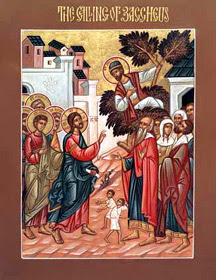I have been slowly reading through a book entitled Philosophers Who Believe - The Spiritual Journey of 11 Leading Thinkers. This book is a collection of essays from 11 prominent contemporary philosophers from the English speaking world of North America and England. Each describes his path to the Christian Faith, often cast as a real revelation, as in C.S. Lewis' famous description of being "surprised by joy." As the book cover states: "These philosophers explode the stereotype that intellectuals cannot believe."
One of these thinkers is John Rist. I was drawn to his chapter because I have read his excellent book on St. Augustine. He is a historian of philosophy and has already written books on Plotinus and the Stoics. What further caught my attention as he was explaining his "conversion" to Christianity, were a few insightful paragraphs that he wrote about abortion, under the subheading of "The Search for Justice." After his Roman Catholic wife suffered through two miscarriages, they both began to think long and hard on willful "terminations." I would like to share these few paragraphs with you as a further follow-up to our recent Sanctity of Life Sunday and a meditation that I sent out last Thursday with some passages from Fr. Breck's book on Orthodox bioethical thinking. When John Rist began to think hard about abortion, he still was not a Christian, but it was precisely this issue that made him think further about the existence of God. So, from his spiritual autobiographical essay entitled "Where Else?," the philosopher John Rist writes the following:
The problem of justice which from the mid-sixties came increasingly to attract my attention was that of abortion, as issue which in my younger days of growing radicalism I had ignored, following the stream of fashion ...
Abortion did not concern me first a religious matter, as issue concerned with the sanctity of life. Indeed, a person who does not believe in God can hardly be expected to take the "sanctity" of life seriously. For me, abortion was a simple question of justice, of unjust killing. One was not allowed (rightly) to "terminate" the lives of one's infants or teenagers because they were too expensive or troublesome; on the same grounds one should not therefore be allowed to kill one's unborn child either. What mattered was simply whether or not the child is a human being. Once I satisfied myself that it is - and later scientifil findings have only confirmed that view, confirming also that those who deny it deny it merely because it is inconvenient, that is, because they choose to deny it - then if any "unjust" killing is wrong, abortion is wrong. It is the killing of the innocent and the defenseless for no other reason than that one wants them out of the way.
Note that this is not an argument against all killing; I am not and have never been a pacifist. This argument against abortion does not depend on a claim that all killing is wrong; it is a claim that no one should be killed simply because someone wishes them dead and they are unable to defend themselves. It is important to recognize that the unborn are not only innocent; they are incapable of intending evil or doing anything by their own deliberate action which is in any way harmful or dangerous to anyone. To kill them is to kill them because they happen - inconveniently - to exist.
I admire John Rist's lucidity in uncovering the basic issues involved in the abortion debate and stating them clearly. It is that clarity that keeps the issue alive at the most serious level. However, he challenges those of a "prolife" position not to fall into the same blindness of denial when other inconvenient facts of life come before our attention:
I became disturbed that many of those opposed to other political and social injustices seemed to favor abortion; it made me suspect that their reasons for opposing other injustices might not be as firmly grounded as they and I had assumed. I also worried about the attitudes of some other "prolifers," as we began to be called when the political process to allow the legal killing of the unborn built up in the sixties. Some of them seemed curiously oblivious to other injunctgions to assist their fellow human beings, even when they might have regarded these injunctions as divinely sanctioned. Again, it seemed that the explanation lay in the false ethical view that if I do not admit something (such as exploitation of the poor or disadvantaged) to be wrong, then it is not wrong; it can be explained away as, for example, a merely unfortunate function of the laws of economics. There is no obligation to do more than allow other people to come into existence and compete, however unfair the conditions.
I believe that over the years many Christian churches and organizations have made a point of addressing that very fair and telling reproach. We must be willing to support and assist children who are born into a world suffering from injustice and marked by an unfair "playing field." A direct experience of that injustice is what drives many disadvantaged young women toward an abortion, even against their conscience. Whatever our modest contributions may be, "prolife" must extend beyond the womb and into the light of day.
Fr. Steven









